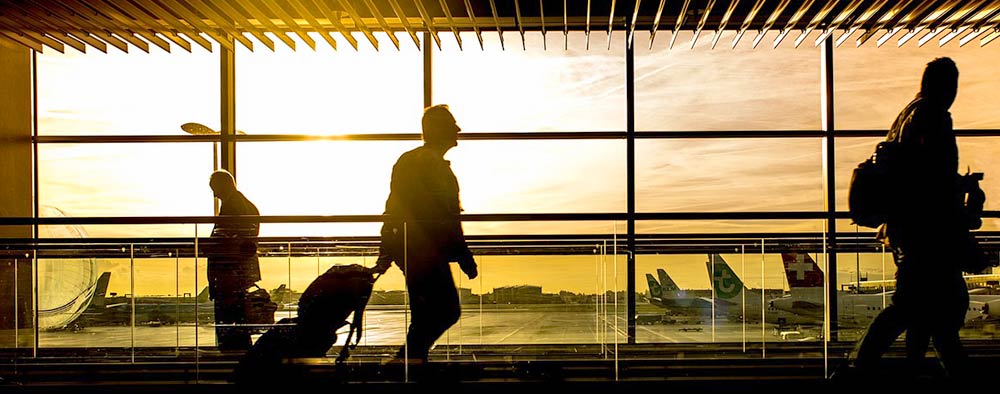by Brent Hearn •
For many, air travel is cause for excitement. It can mean a much-anticipated vacation or a long-overdue trip to see loved ones for the holidays. Even traveling for business can be something to look forward to; a work conference in a city with different awful traffic than your own can be a nice change of pace! (If you’re going to have yet another meeting that could have been an email, you may as well hop a jet and get a few expensed meals for your trouble.)
All that said, traveling by air can also be a nightmare. You’re crammed in a confined space with people you don’t know, some of whom have habits, personality traits, and germs that you’d rather avoid. There are a thousand variables that can negatively impact your routine, your sleep habits, and your overall health.
Here’s the thing that’s often overlooked though: Maximizing your chances for a great trip doesn’t begin at the airport. That’s why we’re here to offer a few tips to prepare for your upcoming trip. Consider it our holiday gift to you! (We’d offer you gingerbread, but then we’d have less gingerbread, and that just won’t do.)
Make sure you’re good to fly in the first place.
This is one you’ll want to take seriously. If you suffer from certain chronic medical conditions, it’s important to consult with your physician to address any concerns before hopping on that plane. (These include—but are not necessarily limited to—cardiovascular disease, diabetes, lung disease, mental illness, seizures, stroke, recent surgery, or a history of deep vein thrombosis or pulmonary embolism.) The same goes for anyone pregnant, sick, or who’s recently undergone a medical procedure.
Would it be a serious bummer to cancel a trip you’ve been looking forward to? Of course it would. But not as much of a bummer as it being your last trip. Don’t just assume you’re good to fly; consult your doctor first! For more information, check out the “Air Travel” entry in the CDC Yellow Book 2024.
Check with the airline for any disability considerations.
Will you need supplemental oxygen on the plane? Do you need accommodations for a disability? It’s vital that you know the airline’s procedures for your particular situation. Save yourself time and stress by doing your research well before it’s time for your tip.
Make a list (and check it twice) to make sure you have everything.
Whether it’s medically crucial (medications, supplies, etc.) or something to make the flight more comfortable and relaxing (a fancy neck pillow or that sleep mask that’s getting rave reviews on social media), it’s a lot easier and less stressful to have it with you than to try to track it down in an unfamiliar place.
Prepare for any sleep disruptions.
6 Tips for Better Sleep When You Travel from Johns Hopkins Medicine offers some sage advice for preparing your body for a new sleep schedule. The article recommends adjusting your bedtime incrementally in the days leading up to your trip (either earlier or later depending on your destination’s time zone).
Short trips are the exception; if you’re staying somewhere for two days or less, stick to your usual sleep schedule. (By the time you’d adjusted to a new one, it would be time to go home.)
Take Care of Your Body’s Needs Before You Board
Remember all the things your teachers told you to do before you took a standardized test? They were right, and the same rules apply for pre-flight prep. (Some advice is worth repeating because it’s so tried and true). Get a good night’s sleep. Eat a good meal. Hydrate. Go to the bathroom.
Now…have a great trip and bring us back some goodies! (Gingerbread, perhaps? We seem to be out.)
Sources:
Centers for Disease Control and Prevention: Air Travel: CDC Yellow Book 2024
familydoctor.org: Air Travel Health Tips
Johns Hopkins Medicine: 6 Tips for Better Sleep When You Travel









 ▶︎
▶︎  Why is the Discount Challenge prize amount $15,024? Because that is the average “per-occurrence” fine for Medicare inducements. That’s not $15,024 per patient, that’s not per provider, that’s PER VISIT. Stinks, doesn’t it? To us, the prize amount is worth the investment if we can help our profession better understand proper discounting.
Why is the Discount Challenge prize amount $15,024? Because that is the average “per-occurrence” fine for Medicare inducements. That’s not $15,024 per patient, that’s not per provider, that’s PER VISIT. Stinks, doesn’t it? To us, the prize amount is worth the investment if we can help our profession better understand proper discounting.